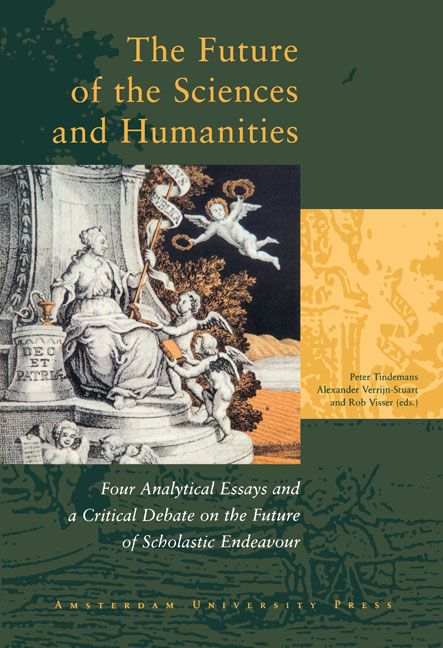 The Future of the Sciences and Humanities
The Future of the Sciences and Humanities Book contents
- Frontmatter
- Preface
- Contents
- 1 The Sciences and Arts Debate A review and some conclusions
- 2 Historical and Structural Approaches in the Natural and Human Sciences .
- The Role of Laws and Contingency in History
- 3 Science and Society in Flux
- Does A New Kind of Science Require a New Kind of Scholar or a New Kind of University?
- 4 Science for the 21st Century
- Redrawing Disciplinar Boundaries – but to What Degree?
- 5 Science and Democracy
- Science and Democracy: a Difficult Relationship: ‘An enlightened and elitist essay on an unresolvable problem’
- 6 Epilogue
- 7 Appendix
4 - Science for the 21st Century
Published online by Cambridge University Press: 03 February 2021
- Frontmatter
- Preface
- Contents
- 1 The Sciences and Arts Debate A review and some conclusions
- 2 Historical and Structural Approaches in the Natural and Human Sciences .
- The Role of Laws and Contingency in History
- 3 Science and Society in Flux
- Does A New Kind of Science Require a New Kind of Scholar or a New Kind of University?
- 4 Science for the 21st Century
- Redrawing Disciplinar Boundaries – but to What Degree?
- 5 Science and Democracy
- Science and Democracy: a Difficult Relationship: ‘An enlightened and elitist essay on an unresolvable problem’
- 6 Epilogue
- 7 Appendix
Summary
ABSTRACT. Science, in its interest in searching for knowledge and trying to make its products robust, can be contrasted with science as an authority, which often relies on traditional ways of knowledge production and disciplinary controls of quality. If authority as such, disciplinary or otherwise, rules, science becomes its own worst enemy. While this is an “essential tension”, it becomes tractable in practice, and in a variety of ways.
Science as a mosaic of search practices and a range of modes of knowledge production, embedded in institutions and in society in general, is evolving. Disciplinary boundaries become less important in genomics and nanotechnology, but also in earth and environmental sciences. And the interactions between science and society are changing: relevance to economic and social issues is important, expertise is needed but also contested. Science-as-weknow-it cannot be the final word.
But science-as-we-know-it is itself a product of a long-term sociocognitive evolution, in which some attempts to produce robust knowledge (as in the natural-history mode) were backgrounded and others (as in the experimental and/or controlled-conditions mode) were foregrounded. A historical and philosophical detour allows us to put science-as-we-know-it in perspective.
The important question then is what the further evolution might be. Gibbons et al. have put up a strong diagnosis, of a disciplinary and university-based Mode 1 of knowledge production being overtaken by a transdisciplinary, multi-site and fluid Mode 2 of knowledge production. Their diagnosis must be nuanced (Mode 2 search practices were around all the time), but also shifted. It is not just a matter of discovery in the context of application (in industry, and with economic goals). The complexities of the natural world are striking back, and this requires a renewed natural-history approach.
Already for this reason, indigenous (and local) knowledge has become important, and creates a challenge to Western-science-aswe-know-it. Underlying world-views are now being articulated, and this raises the question about the world view embedded in Western science. Multi-culturalism is not the answer to this question, but is definitely the site to explore possible answers. The African Renaissance movement, and the official recognition, in New Zealand, of Maori approaches to knowledge production are two of such sites.
Clearly, science in the 21st century will not be like science-as-weknow-it.
- Type
- Chapter
- Information
- The Future of the Sciences and HumanitiesFour Analytical Essays and a Critical Debate on the Future of Scholastic Endeavor, pp. 99 - 148Publisher: Amsterdam University PressPrint publication year: 2002


